The Case of the Global Plastics Treaty
Earth Summit, Rio de Janeiro 1992
- UN Framework Convention on Climate Change. Legally binding. It sets the skeleton for the objectives (broad principles, general format, etc…). COP is ruled by this framework.
- The parties are responsible for the creation of substantive rules (e.g. reducing emissions).
- 2016 Paris Agreement. Legally binding as well. Agreement on a commitment to determine national regulations (bottom-up).
- The states define aims and principles and limit global warming to 2 degrees but leave to eachs discretion how to do it.
- From a civil society perspective→did the treaty succeed in its goals? 24% of glaciers have been lost, we can see this in the CH.
- UN Convention on Biological Diversity.
- UN Convention to Combat Desertification (1996).
- Rio Declaration on Environment and Development.
- Cool promises with 24 principles to guide state action→polluters responsible for pollution, common responsibilities, developing vs developed states (do treaties hinder development? development at expense of health is illusory but poor countries need resources from rich ones to help), etc… Precautionary principles such as the fact that activity should be regulated even when its impact isn’t determined to be the cause of an effect.
Triple planetary crisis
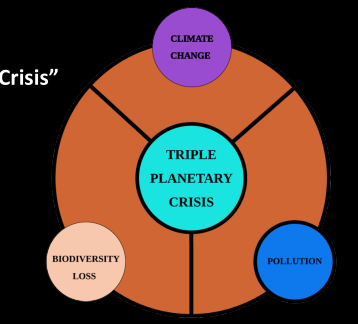 It is wrong to look only at climate change and not the root of the problems of our planet. E.g. it took decades for the words fossil fuels to be reflected on the final version of treaties. Some states have vested interests and have avoided root causes since consensus is needed in environmental treaties clauses.
It is wrong to look only at climate change and not the root of the problems of our planet. E.g. it took decades for the words fossil fuels to be reflected on the final version of treaties. Some states have vested interests and have avoided root causes since consensus is needed in environmental treaties clauses.
Evolution
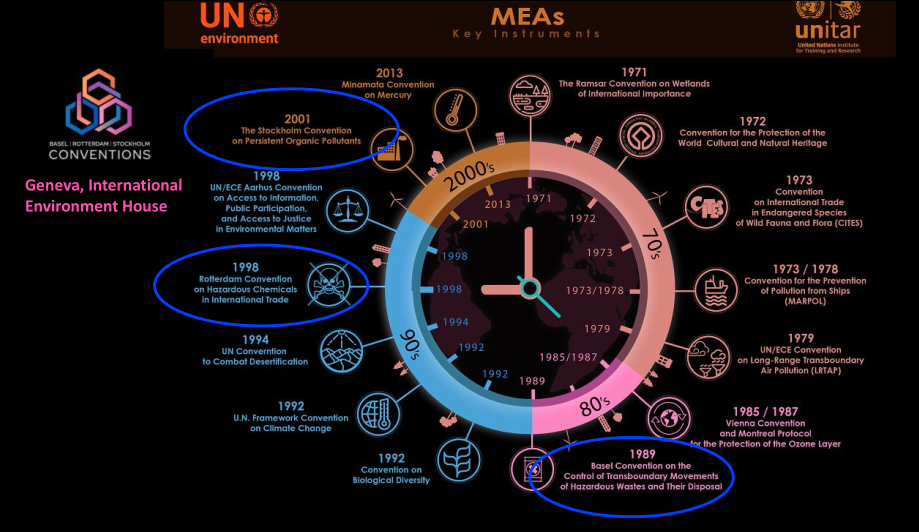 In the last 50 years there have been significant development in environmental law. The graph illustrates the main agreements. The Montreal Protocol f.ex. was a great success.
In the last 50 years there have been significant development in environmental law. The graph illustrates the main agreements. The Montreal Protocol f.ex. was a great success.
However, 7 of the 9 planetary boundaries have been crossed→ except ozone because of MP. It phased out dangerous pollutant with almost universal adherence. Cause here consensus isn’t a must→no consensus=voting. There has hardly ever been voting cause when voting is a danger compromise is preferred to division and singling out of minority states.
The CH had a significant role in these conventions.
Present time
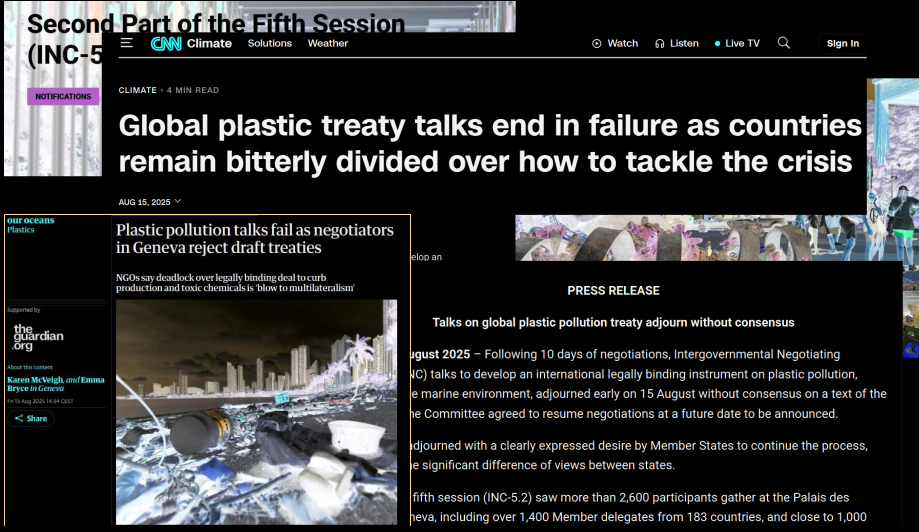 The GPT should have been passed at the Palais des Nations this year after the failure of 2024 in Kores but it didn’t work. News outlets called it a failure.
The GPT should have been passed at the Palais des Nations this year after the failure of 2024 in Kores but it didn’t work. News outlets called it a failure.
What went wrong with the GPT?
- “States’ redlines are incompatible. They leave no pathway for agreement.”- Australia.
- “Without agreement on the scope of the treaty, this process is not on the right track.” - Kuwait, for GCC.
- “All decisions should be taken by consensus.” - India.
- “Negotiations were consistently blocked by a small number of States who don’t want progress.” - Colombia.
- “A deadlock-breaking mechanism is needed, given the wide diversity of views which lend themselves to deadlock.” – South Africa.
- “There was an over-reliance on consensus. Consensus is worth seeking when it moves us forward, not when it stalls the process.” - Fiji, for Pacific SIDS.
- SIDS are the most affected by this pollution and are at the forefront of the fight.
- “Measures are needed across the full life cycle of plastics to address plastic pollution. However, the parties were too far apart. After six rounds of negotiations, the process needs a time out.” - Switzerland. A lowest denominator text was even tried (voluntary measures with no teeth). But the process wasn’t going well, even when another improved text was born 6 hours before the end of the negotiations. 80 states took the floor and showed that each party’s red lines were incompatible.
The story of plastics: a love story?
- Plastics are ubiquitous: agriculture, fisheries, food industry, construction, transportation, health, fashion industry, etc.
- They took the world by storm and are now everywhere.
- Integral part of modern economies and driver of economic development, notably of major emerging markets.
- Trade in plastics worth 1.1 trillion US$ / year.
- Powerful industries are interested in these diplomatic processes because if affects their profits. Some are in favour of a legally binding GPT though→e.g. Nestle.
- They want global rules so that they are not put at a disadvantage.
- There is an important link between environmental law and trade law (WTO).
- This is very important for emerging markets/economies (e.g. China and India→invested lots into plastic).
- What is plastic? Fossil fuels + chemicals (petrochemicals→depending on the chemical the plastic is hard, soft… etc=petrochemical industry is very interested in these negotiation).
- They send lobbyists (e.g. Dell chemicals or Vinyl Institute).
- 234 registered at the GPT negotiations in Geneva, some actually embedded in state delegations. This isn’t that weird, the other side does the same (e.g. NGOs).
- Versatile, durable, low-cost.
- Primary plastic polymers (virgin plastic).
- Plastic products.
- Plastic waste.
- They send lobbyists (e.g. Dell chemicals or Vinyl Institute).
A drama?
Economic benefit, but at a great price:
- 436 million tons of plastics are produced each year - number will triple over the next 40 years.
- Up to 80% of all plastic = waste – i.e. neither recycled, nor disposed of in a controlled manner - Single use plastic major source.
- Of the 10 billion tons of plastic produced since the 1950s, only about 9% recycled.
- Ocean plastic: 75 to 199 million tonnes -8 to 10 million metric tons new plastic per year.
- Toxicity of plastics: >13,000 different chemicals used in plastics, of which 3,000 have been identified as toxic, 6,000 unknown effects.
- Micro- & nano-plastics: everywhere, including our bodies!
- Also a health crisis.
At the beggining, in the 1980s it was painted as an issue for advocacy. At first they picked up trash, but when they started counting the trash with scientists and this gave us a better idea of the pollution (origin, effects, etc…). The plastic industry was present, they paid for cleanups to control the narrative: the plastic pollution problem is because of the behaviour of people which throw their trash everywhere.
- But the problem is more upstream→16k chemicals (lack of transparency btw) that can be highly toxic and even cancerous (3k cancerous and endocrinal disruptors).
The plastic pollution treaty negotiation - process
Consensus problem on rules, there were disagreements on the scope of the treaty and the organisation of the work or how to take decisions (to what extent should they be top-down or bottom-up, vote as last resort, etc…). Also developing states wanted to sign but be helped with tech to fullfill obligations.
UN Environment Assembly (UNEA).
- 2017-2021: Ad Hoc Expert Group on marine litter and microplastics.
- Expressed concern and need for a new treaty.
- Critical preparatory process to exchange information, see political positions and red lines.
- 2021: Ministerial Conference.
- 2 March 2022: UNEA 5.2 adopts resolution 5/14 “End plastic pollution: Towards an international legally binding instrument,” establishing:
- Open-ended Working Group (OEWG) for preparatory work (May-June 2022): tasked with finalizing the Rules of Procedure.
- Intergovernmental Negotiation Committee (INC) “to begin its work during the second half of 2022, with the ambition of completing its work by the end of 2024”.
- This was the reason accounting for failure, plastic is too complex of an issue to be solved in so little time.
- Deadlines and pressure can help but this was too much.
- This was the reason accounting for failure, plastic is too complex of an issue to be solved in so little time.
- INC-1 November 2022 (Punta-del-Este) failure to adopt Rules of Procedure; INC-2 May 2023 (Paris); INC-3 November 2023 (Nairobi); INC-4 April 2024 (Ottawa); INC-5 November 2024 (Busan); INC-5.2 August 2025 (Geneva) no consensus on draft treaty text.
- Many bracketed words, therefore a lack on consensus in ROPs (e.g. voting rights of EU). Some states took advantage and came back on the decision-taking rules on a matter on substance (voting when lack of consensus f.ex.).
- They wanted the best efforts to reach consensus and the possibility of doing a 2/3 vote to get trough deadlocks but some states asked for guarantees to not use this even though ROPs weren’t agreed on. No one dared to come back on this so they proceeded as if consensus was mandatory.
Resolution UNEA 5/14 - End plastic pollution: Towards an international legally binding instrument
Develop an international legally binding instrument on plastic pollution, including in the marine environment… which could include both binding and voluntary approaches, based on a comprehensive approach that addresses the full life cycle of plastic, taking into account… the principles of the Rio Declaration on Environment and Development, as well as national circumstances and capabilities.
- What the INC needs to work on, the ambiguities were exploited by some state to reduce this mandate.
Key questions / main fault-lines:
- What is the full life cycle approach?
- What solutions could be implemented to put an end to the pollution?
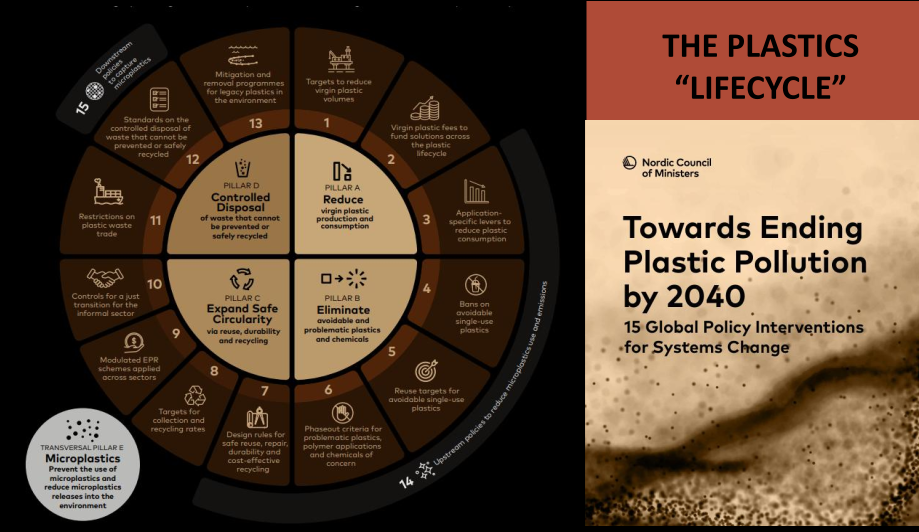
- Good ideas. The ambitions are very high upstream and low downstream, this is what SIDS and the EU want. This might not be likeable to every state.
- What solutions could be implemented to put an end to the pollution?
- Global legally binding rules (top-down) or voluntary measures (bottom-up)?
- And who should pay for all of this? What are the financial mechanism and means of implementation on offer?
- How should decisions be made by the governing body (COP)? Consensus or voting?
INC-5.2
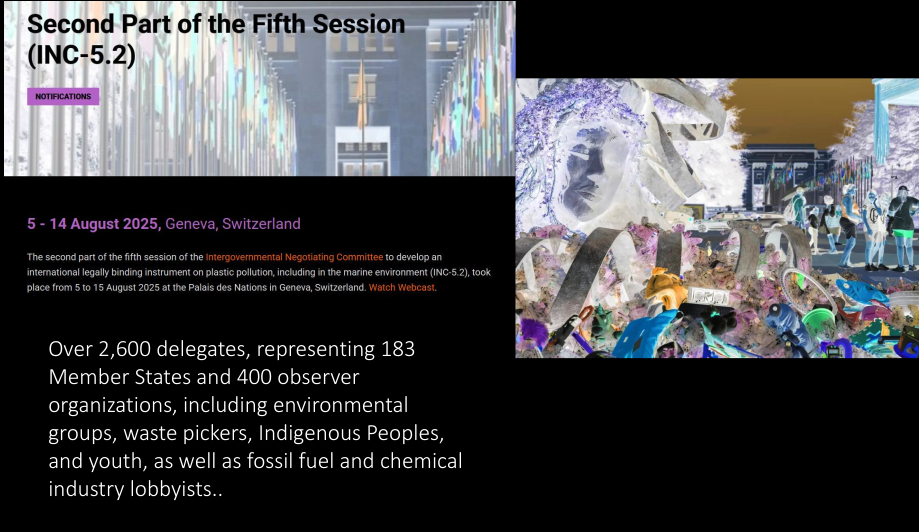 Indigenous people are very affected by the release of toxic chemicals in their waters, and waste pickers are very organised in some countries. It is then natural to find them in these negotiations.
Indigenous people are very affected by the release of toxic chemicals in their waters, and waste pickers are very organised in some countries. It is then natural to find them in these negotiations.
INC structure and modes of work
- Chair: Amb. Vayas Valdivieso (Ecuador) INC-4, 5.1, 5.2 Amb. Meza Cuadra (Peru) INC-1, 2, 3.
- Normally you want 1 single chair, not ideal.
- Secretariat: UNEP.
- Bureau: two members per Regional Group.
- Plenary meetings: formal, recorded, decision-making.
- Contact Groups: informal, off-the-record, two co-facilitators each when contact groups didn’t work.
- CG 1 – plastic products, product design, sustainable production.
- CG 2 – waste management, existing pp, just transition.
- CG 3 – financial resources, capacity building, technical assistance.
- CG 4 – implementation and compliance, reporting, COP, etc.
- Informal meetings: on single issues, convened by single State.
- Legal Drafting Group: open-ended.
State groups
- 6 Regional Groups: formal status (INC Bureau, group positions).
- Africa (Rwanda & Senegal).
- Asia-Pacific (Japan & Saudi Arabia).
- Eastern Europe (Estonia & Georgia).
- GRULAC - Latin America and Carribean (Peru and Ecuador/Chair).
- SIDS - Small-Island Developing Countries (Antigua and Barbuda).
- WEOG - Western Europe and Other States (Sweden & USA).
- Informal groups – loose coalitions, shifting loyalties.
- High Ambition Coalition (HAC): close to 80 countries; full life cycle approach; seek legally binding global rules (top-down) to: limit primary plastic production, phase out harmful plastics products and chemical additives, standards for product design, etc.
- China has recently moved towards this group on the spectrum. Although they don’t like the idea of a cap on raw plastic.
- ‘Like Minded’ Group (LMG): mostly petrochemical States; downstream measures / waste management; nationally determined measures (bottom-up); demand consensus decision-making.
- US now closer to this group.
- High Ambition Coalition (HAC): close to 80 countries; full life cycle approach; seek legally binding global rules (top-down) to: limit primary plastic production, phase out harmful plastics products and chemical additives, standards for product design, etc.
WWF must haves
- Binding global bans and phase-outs of specific plastic products, including those containing chemicals of concern.
- Harmonised requirements on product design and systems necessary for a non-toxic circular economy.
- A comprehensive financing and means of implementation package.
- Mechanisms to enable strengthening of the treaty over time – including COP voting.
- Sustainable production & consumption - supply of raw plastic (primary plastic polymers). Even if at first it’s not very regulating of raw plastics.
Civil society such as WWF can influence negotiations. WWF is more conservative and less ambitious, more trusted by states. It’s complementary with other groups, helps by not naming and shaming (healthy communication) and has good ties with business as well.
The plastic pollution treaty negotiations - What’s next?
- Extend negotiations under current UNEA mandate into INC-5.3 or INC-6?
- Move negotiations into existing MEA – Basel Convention - and make it a Protocol?
- It already has ROPs, voting, commissariat, etc… Suggested by the Swiss Ambassador.
- Begin a new process outside of UNEA – e.g. via UN General Assembly?
- The definition of insanity is doing more of the same and expecting a different result.
- How the negotiation body will take its decisions will be critical ⇒ adopt standard Rules of Procedure allowing for voting as a last resort.
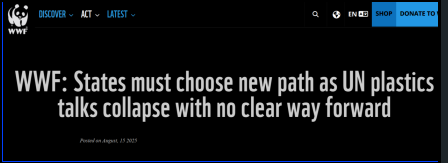 It is necessary to adopt ROPs and voting systems.
It is necessary to adopt ROPs and voting systems.
Effective (environmental) multilateralism?
UNSG’s High-Level Advisory Board on Effective Multilateralism (2023)
- Overreliance on decisions by consensus is an obstacle to effective multilateralism.
- This has led to stagnation in denuclearisation, hampered progress in global equitable finance, and enabled a minority to obstruct meaningful action on the environment.
- Where consensus prevents equitable and effective decision-making on issues of global concern, alternatives must be found. Consensus is a laudable aspiration, but let’s not sacrifice the future of the planet on the altar of unanimity.
A solution could be using scientific diplomacy→swiss way.
Conclusion

